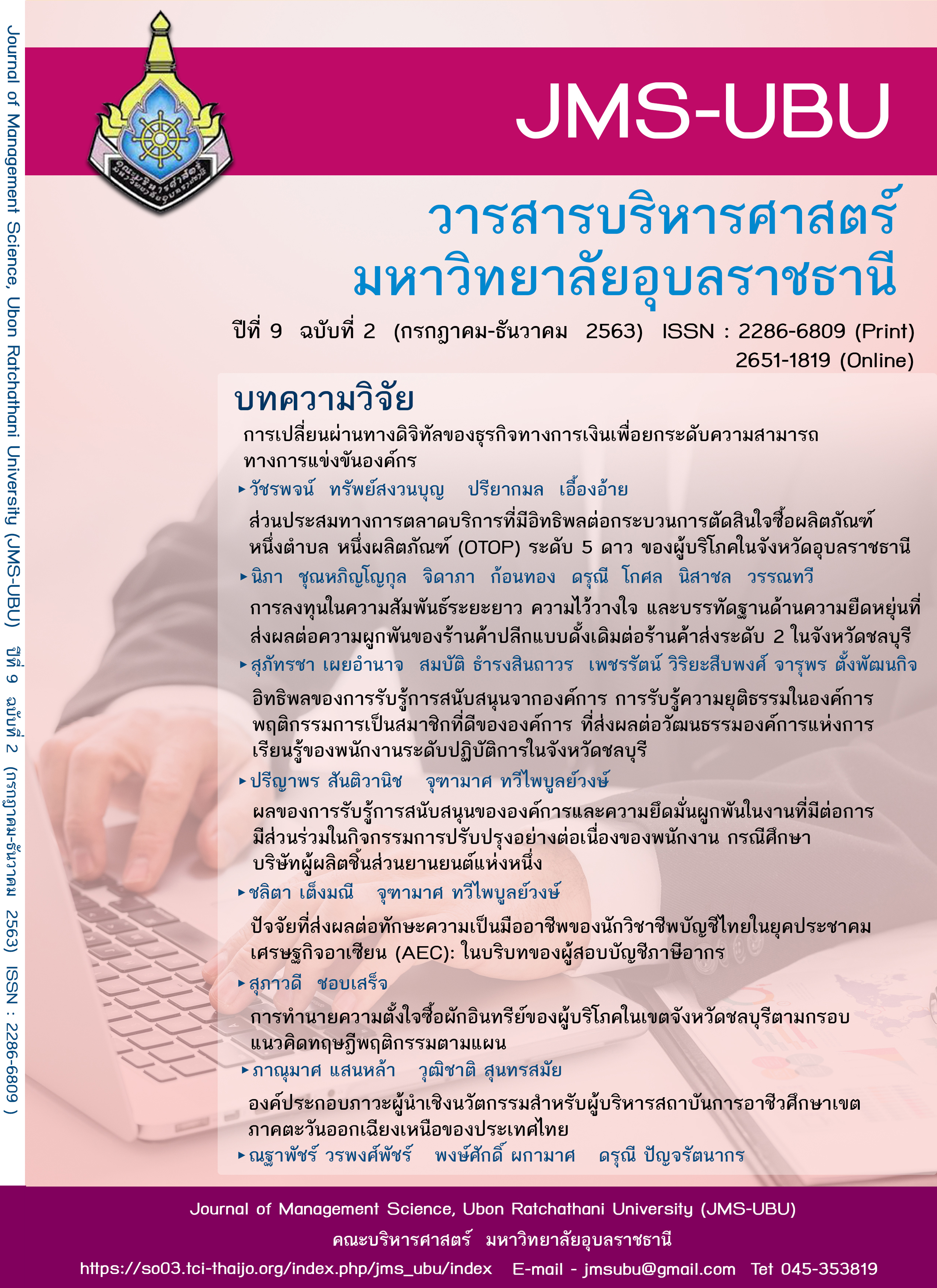ผลของการรับรู้การสนับสนุนขององค์การและความยึดมั่นผูกพันในงานที่มีต่อการมีส่วนร่วมในกิจกรรมการปรับปรุงอย่างต่อเนื่องของพนักงาน กรณีศึกษา บริษัทผู้ผลิตชิ้นส่วนยานยนต์แห่งหนึ่ง
Main Article Content
บทคัดย่อ
การวิจัยครั้งนี้มีวัตถุประสงค์เพื่อ 1) วิเคราะห์ระดับการรับรู้การสนับสนุนขององค์การ ความยึดมั่นผูกพันในงาน และการมีส่วนร่วมในกิจกรรมการปรับปรุงอย่างต่อเนื่องของพนักงาน และ 2) วิเคราะห์อิทธิพลการรับรู้การสนับสนุนขององค์การและความยึดมั่นผูกพันในงานที่มีผลต่อการมีส่วนร่วมในกิจกรรมการปรับปรุงอย่างต่อเนื่องของพนักงาน ประชากรที่ใช้ในการศึกษา ได้แก่ บริษัทผู้ผลิตชิ้นส่วนยานยนต์แห่งหนึ่ง ในนิคมอุตสาหกรรมเหมราชอีสเทิร์นซีบอร์ด จังหวัดระยอง ทำการรวบรวมข้อมูลโดยใช้แบบสอบถามจากกลุ่มตัวอย่างจำนวน 338 คน สถิติที่ใช้ในการวิเคราะห์ข้อมูล ได้แก่ ค่าร้อยละ ค่าเฉลี่ย ส่วนเบี่ยงเบนมาตรฐาน และการวิเคราะห์โมเดลสมการโครงสร้าง ผลการวิจัยพบว่า ในภาพรวมพนักงานมีระดับการรับรู้การสนับสนุนขององค์การในระดับมาก ความยึดมั่นผูกพันในงานอยู่ในระดับมาก และการมีส่วนร่วมในกิจกรรมการปรับปรุงอย่างต่อเนื่องอยู่ในระดับมาก จากผลการทดสอบโมเดลสมการโครงสร้างที่ปรับใหม่ พบว่ามีความสอดคล้องกับข้อมูลเชิงประจักษ์ โดยมีค่า CMIN/DF= 1.643, GFI = 0.961, AGFI = 0.937, CFI = 0.974, RMR = 0.014, RMSEA = 0.044, NFI = 0.937 โดยการรับรู้การสนับสนุนขององค์การมีอิทธิพลเชิงบวกต่อความยึดมั่นผูกพันในงานอย่างมีนัยสำคัญทางสถิติที่ระดับ 0.001 และมีอิทธิพลในเชิงบวกต่อการมีส่วนร่วมในกิจกรรมการปรับปรุงอย่างต่อเนื่องอย่างมีนัยสำคัญทางสถิติที่ระดับ 0.001 ส่วนความยึดมั่นผูกพันในงานมีอิทธิพลเชิงบวกต่อการมีส่วนร่วมในกิจกรรมการปรับปรุงอย่างต่อเนื่องอย่างมีนัยสำคัญทางสถิติที่ระดับ 0.05
Downloads
Article Details
บทความที่ตีพิมพ์ในวารสารบริหารศาสตร์ มหาวิทยาลัยอุบลราชธานี เป็นลิขสิทธิ์ของวารสาร โดยเนื้อหาและความคิดเห็นในบทความเป็นความรับผิดชอบของผู้เขียนแต่ละท่าน ไม่เกี่ยวข้องกับคณะบริหารศาสตร์ มหาวิทยาลัยอุบลราชธานีแต่อย่างใด และหากมีข้อผิดพลาดประการใด ผู้เขียนจะเป็นผู้รับผิดชอบต่อบทความของตนเองแต่เพียงผู้เดียว
เอกสารอ้างอิง
กัลยา วานิชย์บัญชา. (2556). การวิเคราะห์สมการโครงสร้าง (SEM) ด้วย AMOS. กรุงเทพฯ: ห้างหุ้นส่วนจำกัดสามลดา.
ปพน ณัฐเมธาวิน. (2560). อิทธิพลของการรับรู้การสนับสนุนขององค์การที่มีต่อความยึดมั่นผูกพันในงานโดยมีปัญญาด้านการเข้าใจตนเองเป็นตัวแปรส่งผ่าน. วารสารมนุษยศาสตร์ปริทรรศน์. 39(2), 85-93.
พิริยะ ริยะตานนท์. (2561). ปัจจัยการรับรู้การสนับสนุนจากองค์การที่มีต่อความสำเร็จของการนำระบบลีนมาใช้มุ่งเน้นการมีส่วนร่วมในกิจกรรมปรับปรุงอย่างต่อเนื่อง (ไคเซ็น) ในโรงงานอุตสาหกรรมอิเล็กทรอนิกส์ XYZ ในนิคมอุตสาหกรรมแหลมฉบัง. (วิทยานิพนธ์ปริญญามหาบัณฑิต). มหาวิทยาลัยเกษตรศาสตร์, สาขาวิชาการบริหารและพัฒนาอุตสาหกรรม.
สำนักงานเศรษฐกิจอุตสาหกรรม. (2562). ภาวะเศรษฐกิจอุตสาหกรรมไทยไตรมาสที่ 2/2562. สืบค้นจาก http://www.oie.go.th/assets/portals/1/fileups/2/files/production%20conditions/r_aprjun2562.pdf
สุภาวิตา ผลเจริญ. (2558). ความสัมพันธ์ระหว่างการรับรู้ การสื่อสาร การสนับสนุนขององค์การกับการมีส่วนร่วมในกิจกรรมการปรับปรุงอย่างต่อเนื่อง (ไคเซ็น) ในอุตสาหกรรมยานยนต์ นิคมอุตสาหกรรมอีสเทิร์นซีบอร์ด จังหวัดระยอง. (วิทยานิพนธ์ปริญญามหาบัณฑิต). มหาวิทยาลัยเกษตรศาสตร์, สาขาวิชาการบริหารและพัฒนาอุตสาหกรรม.
Boikanyo, D. H., & Heyns, M. M. (2019). The effect of work engagement on total quality management practices in a petrochemical organization. South Africa Journal of Economic and Management Sciences 22(1), 1-13.
Cohen, J. M., & Uphoff, N. T., (1977). Rural Development Participation. Ithaca: Cornell University.
Eisenberger, R., Huntington, R., Hutchison, S., & Sowa, D. (1986). Perceived organization support. Journal of Applied Psychology. 71(3), 500-507.
Hair, J. F., Black, W. C., Babin, B. J., & Anderson, R. E. (2010). Multivariate Data Analysis. Pearson upper saddle river: Pearson education.
Rhoddes, L., & Eisenberger, R. (2002). “Perceived organization support: A review of the literature.” Journal of Applied Psychology, 87: 698.
Schaufeli, W. B., Salanova, M., González-Romá, V., & Bakker, A. B. (2002). The measurement of engagement and burn out: A two-sample confirmatory factor analytic approach. Journal of Happiness Studies. 3(1), 71-93.
Schaufeli, W. B., Bakker, A. B., & Salanova, M. (2006). The measurement of work engagement with a short questionnaire: A cross-national study. Educational and Psychological Measurement, 66(4), 701-716
Xangsayasane, S. (2560). ความสัมพันธ์ระหว่าง การรับรู้การสนับสนุนจากองค์การ การรับรู้ความสามารถของตนเอง และความมุ่งมั่นในการทำงาน ที่มีต่อผลการปฏิบัติงานของพนักงานธนาคาร ในกลุ่มธนาคารธุรกิจของรัฐ ในเขตพื้นที่นครหลวงเวียงจันทน์ สปป.ลาว. (วิทยานิพนธ์ปริญญามหาบัณฑิต). มหาวิทยาลัยเกษตรศาสตร์, สาขาวิชาการบริหารและพัฒนาอุตสาหกรรม.

